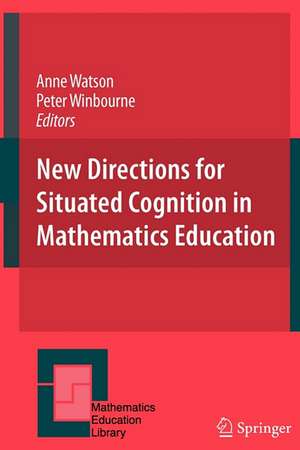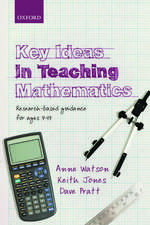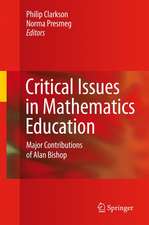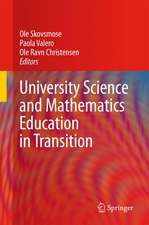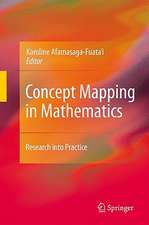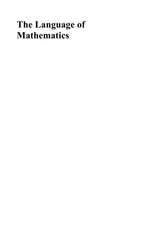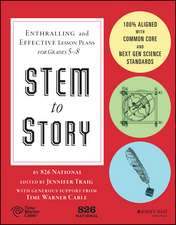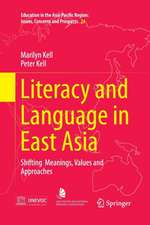New Directions for Situated Cognition in Mathematics Education: Mathematics Education Library, cartea 45
Editat de Anne Watson, Peter Winbourneen Limba Engleză Hardback – 3 ian 2008
In this book a dynamic view of knowledge is taken by all the authors. Although knowledge is considered what is produced in learning environments, each chapter offers a different perspective on its relationship to the individual, group, activity, historical conventions, and authoritarian views of meaning.
New Directions for Situated Cognition in Mathematics Education provides a resource for educators, researchers and students to approach situated cognition through an organized and diverse source.
| Toate formatele și edițiile | Preț | Express |
|---|---|---|
| Paperback (1) | 700.75 lei 6-8 săpt. | |
| Springer Us – 29 noi 2010 | 700.75 lei 6-8 săpt. | |
| Hardback (1) | 948.29 lei 6-8 săpt. | |
| Springer Us – 3 ian 2008 | 948.29 lei 6-8 săpt. |
Din seria Mathematics Education Library
-
 Preț: 389.70 lei
Preț: 389.70 lei - 15%
 Preț: 645.96 lei
Preț: 645.96 lei - 18%
 Preț: 742.97 lei
Preț: 742.97 lei - 18%
 Preț: 1394.84 lei
Preț: 1394.84 lei - 18%
 Preț: 942.10 lei
Preț: 942.10 lei - 18%
 Preț: 1544.80 lei
Preț: 1544.80 lei - 15%
 Preț: 652.49 lei
Preț: 652.49 lei - 18%
 Preț: 1325.82 lei
Preț: 1325.82 lei - 18%
 Preț: 1225.48 lei
Preț: 1225.48 lei - 15%
 Preț: 643.34 lei
Preț: 643.34 lei - 18%
 Preț: 1221.07 lei
Preț: 1221.07 lei - 18%
 Preț: 952.89 lei
Preț: 952.89 lei - 18%
 Preț: 950.52 lei
Preț: 950.52 lei - 24%
 Preț: 1445.43 lei
Preț: 1445.43 lei - 18%
 Preț: 1224.54 lei
Preț: 1224.54 lei - 15%
 Preț: 651.19 lei
Preț: 651.19 lei -
 Preț: 391.61 lei
Preț: 391.61 lei - 18%
 Preț: 948.16 lei
Preț: 948.16 lei - 18%
 Preț: 944.19 lei
Preț: 944.19 lei - 18%
 Preț: 1380.95 lei
Preț: 1380.95 lei - 18%
 Preț: 947.85 lei
Preț: 947.85 lei - 18%
 Preț: 948.61 lei
Preț: 948.61 lei - 15%
 Preț: 635.31 lei
Preț: 635.31 lei - 15%
 Preț: 644.63 lei
Preț: 644.63 lei - 15%
 Preț: 646.43 lei
Preț: 646.43 lei - 15%
 Preț: 647.59 lei
Preț: 647.59 lei
Preț: 948.29 lei
Preț vechi: 1156.45 lei
-18% Nou
Puncte Express: 1422
Preț estimativ în valută:
181.48€ • 197.06$ • 152.44£
181.48€ • 197.06$ • 152.44£
Carte tipărită la comandă
Livrare economică 22 aprilie-06 mai
Preluare comenzi: 021 569.72.76
Specificații
ISBN-13: 9780387715773
ISBN-10: 0387715770
Pagini: 360
Ilustrații: XII, 360 p.
Dimensiuni: 155 x 235 x 20 mm
Greutate: 0.53 kg
Ediția:2008
Editura: Springer Us
Colecția Springer
Seria Mathematics Education Library
Locul publicării:New York, NY, United States
ISBN-10: 0387715770
Pagini: 360
Ilustrații: XII, 360 p.
Dimensiuni: 155 x 235 x 20 mm
Greutate: 0.53 kg
Ediția:2008
Editura: Springer Us
Colecția Springer
Seria Mathematics Education Library
Locul publicării:New York, NY, United States
Public țintă
ResearchCuprins
School Mathematics As A Developmental Activity.- Participating In What? Using Situated Cognition Theory To Illuminate Differences In Classroom Practices.- Social Identities As Learners And Teachers Of Mathematics.- Looking For Learning In Practice: How Can This Inform Teaching.- Are Mathematical Abstractions Situated?.- ‘We Do It A Different Way At My School’.- Situated Intuition And Activity Theory Fill The Gap.- The Role Of Artefacts In Mathematical Thinking: A Situated Learning Perspective.- Exploring Connections Between Tacit Knowing And Situated Learning Perspectives In The Context Of Mathematics Education.- Cognition And Institutional Setting.- School Practices With The Mathematical Notion Of Tangent Line.- Learning Mathematically As Social Practice In A Workplace Setting.- Analysing Concepts of Community of Practice.- ‘No Way is Can’t’: A Situated Account of One Woman’s Uses and Experiences of Mathematics.
Notă biografică
Anne Watson is Reader in Mathematics Education at the University of Oxford. Before that she taught for many years in maintained secondary schools which served socially diverse areas. She now works in teacher education, and her work with students, and in local schools, and her research is characterised by a concern for social justice through education. In particular, the nature of mathematics classrooms and adolescents’ relationships within them are a central concern. She has published numerous books, articles and papers for both professional and academic audiences and is often asked to talk to national and international audiences of researchers and practitioners.
Peter Winbourne currently lectures in mathematics education at the London South Bank University. After a long career teaching mathematics in inner city multicultural maintained schools, his passion for mathematics and social equity took him into teacher education, preparing people to work in similar schools. His interests developed from specific focus on the uses of new technologies to support learning to answering difficult questions such as why people should bother to learn at all. In answering these questions he has developed his understanding and ideas of theories of situated cognition, seeing these as illuminating the experiences of individuals as they become the people they are going to be.
Peter Winbourne currently lectures in mathematics education at the London South Bank University. After a long career teaching mathematics in inner city multicultural maintained schools, his passion for mathematics and social equity took him into teacher education, preparing people to work in similar schools. His interests developed from specific focus on the uses of new technologies to support learning to answering difficult questions such as why people should bother to learn at all. In answering these questions he has developed his understanding and ideas of theories of situated cognition, seeing these as illuminating the experiences of individuals as they become the people they are going to be.
Textul de pe ultima copertă
New Directions for Situated Cognition in Mathematics Education
Edited by Anne Watson, University of Oxford
Peter Winbourne, London South Bank University
New Directions for Situated Cognition in Mathematics Education gathers current situated cognition theories as applied to the teaching and learning of mathematics by major thinkers in the field. Arranged to be read cover to cover or by the individual chapter, this unique volume examines situated cognition in all levels and contexts of math instruction, in traditional school settings, in adult education, at home, on the job, or on the street. Well-known authorities explore beyond traditional concepts of good practice and the relationship between knowledge and the learner while synthesizing insights from related perspectives, including semiotics, activity theory, ardinas practice, and Moll’s concept of funds of knowledge. The emphasis is not merely on achieving standards or even gaining skills, but on learning as a lifelong activity as chapter authors address such questions as:
Edited by Anne Watson, University of Oxford
Peter Winbourne, London South Bank University
New Directions for Situated Cognition in Mathematics Education gathers current situated cognition theories as applied to the teaching and learning of mathematics by major thinkers in the field. Arranged to be read cover to cover or by the individual chapter, this unique volume examines situated cognition in all levels and contexts of math instruction, in traditional school settings, in adult education, at home, on the job, or on the street. Well-known authorities explore beyond traditional concepts of good practice and the relationship between knowledge and the learner while synthesizing insights from related perspectives, including semiotics, activity theory, ardinas practice, and Moll’s concept of funds of knowledge. The emphasis is not merely on achieving standards or even gaining skills, but on learning as a lifelong activity as chapter authors address such questions as:
- What can math teachers do to make learning vital to children’s identity?
- How does situated cognition relate to tacit knowledge?
- In what ways are mathematical abstractions situated?
- Can vocational math skills be learned away from the workplace?
- How is mathematics knowledge transferred from the class to the home environment?
Caracteristici
No other books are available which take this view specifically in mathematics education Relevance both to researchers and practitioners This is a collection of up-to-date insights into the application of theories of situated cognition Authors are all experienced educators Includes supplementary material: sn.pub/extras
